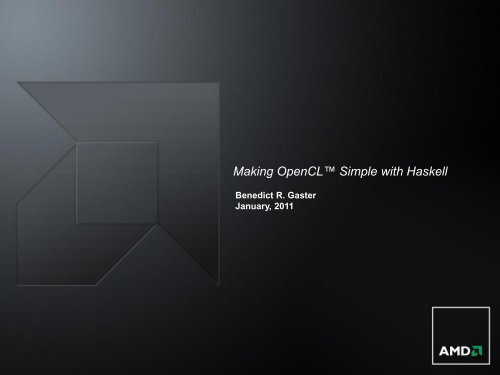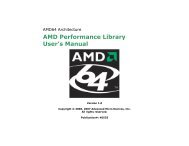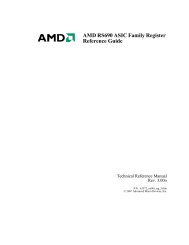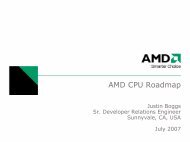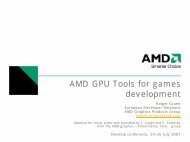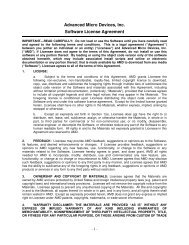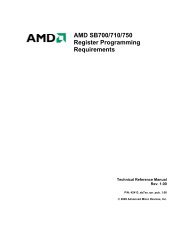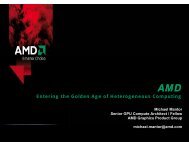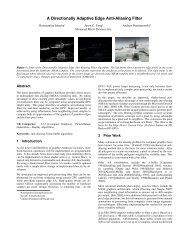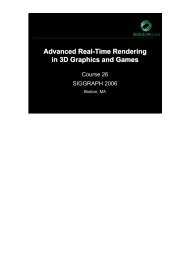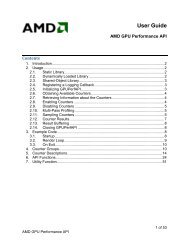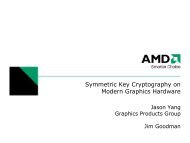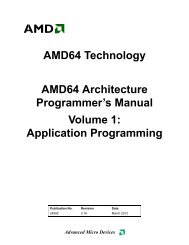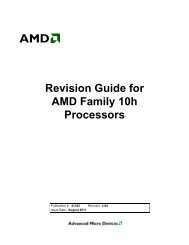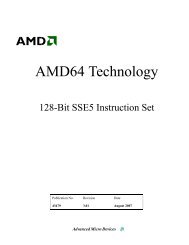Making OpenCL? Simple with Haskell - AMD Developer Central
Making OpenCL? Simple with Haskell - AMD Developer Central
Making OpenCL? Simple with Haskell - AMD Developer Central
Create successful ePaper yourself
Turn your PDF publications into a flip-book with our unique Google optimized e-Paper software.
<strong>Making</strong> <strong>OpenCL</strong> <strong>Simple</strong> <strong>with</strong> <strong>Haskell</strong><br />
Benedict R. Gaster<br />
January, 2011
Attribution and WARNING<br />
The ideas and work presented here are in collaboration <strong>with</strong>:<br />
– Garrett Morris (<strong>AMD</strong> intern 2010 & PhD student Portland State)<br />
Garrett is the <strong>Haskell</strong> expert and knows a lot more than I do about<br />
transforming Monads!<br />
2 | <strong>Making</strong> <strong>OpenCL</strong> <strong>Simple</strong> | January, 2011 | Public
AGENDA<br />
Motivation<br />
Whistle stop introduction to <strong>OpenCL</strong><br />
Bringing <strong>OpenCL</strong> to <strong>Haskell</strong><br />
Lifting to something more in the spirit of <strong>Haskell</strong><br />
Quasiquotation<br />
Issues we face using <strong>Haskell</strong> at <strong>AMD</strong><br />
Questions<br />
3 | <strong>Making</strong> <strong>OpenCL</strong> <strong>Simple</strong> | January, 2011 | Public
4 | <strong>Making</strong> <strong>OpenCL</strong> <strong>Simple</strong> | January, 2011 | Public<br />
Motivation
OPENCL PROGRAM STRUCTURE<br />
5 | <strong>Making</strong> <strong>OpenCL</strong> <strong>Simple</strong> | January, 2011 | Public<br />
Host C/C++ Code <strong>OpenCL</strong> C Device Code<br />
CPU<br />
(Platform and<br />
Runtime APIs)<br />
DEVICE<br />
(<strong>OpenCL</strong> C)
HELLO WORLD OPENCL C SOURCE<br />
__constant char hw[] = "Hello World\n";<br />
__kernel void hello(__global char * out) {<br />
size_t tid = get_global_id(0);<br />
out[tid] = hw[tid];<br />
}<br />
6 | <strong>Making</strong> <strong>OpenCL</strong> <strong>Simple</strong> | January, 2011 | Public
HELLO WORLD OPENCL C SOURCE<br />
__constant char hw[] = "Hello World\n";<br />
__kernel void hello(__global char * out) {<br />
size_t tid = get_global_id(0);<br />
out[tid] = hw[tid];<br />
}<br />
• This is a separate source file (or string)<br />
• Cannot directly access host data<br />
• Compiled at runtime<br />
7 | <strong>Making</strong> <strong>OpenCL</strong> <strong>Simple</strong> | January, 2011 | Public
HELLO WORLD - HOST PROGRAM<br />
// create the <strong>OpenCL</strong> context on a GPU device<br />
cl_context = clCreateContextFromType(0,<br />
CL_DEVICE_TYPE_GPU, NULL, NULL, NULL);<br />
// get the list of GPU devices associated <strong>with</strong> context<br />
clGetContextInfo(context, CL_CONTEXT_DEVICES, 0,<br />
devices = malloc(cb);<br />
8 | <strong>Making</strong> <strong>OpenCL</strong> <strong>Simple</strong> | January, 2011 | Public<br />
NULL, &cb);<br />
clGetContextInfo(context, CL_CONTEXT_DEVICES, cb,<br />
devices, NULL);<br />
// create a command-queue<br />
cmd_queue = clCreateCommandQueue(context, devices[0],<br />
0, NULL);<br />
memobjs[0] = clCreateBuffer(context,CL_MEM_WRITE_ONLY,<br />
sizeof(cl_char)*strlen(“Hello World”, NULL,<br />
NULL);<br />
// create the program<br />
program = clCreateProgramWithSource(context, 1,<br />
&program_source, NULL, NULL);<br />
// build the program<br />
err = clBuildProgram(program, 0, NULL, NULL, NULL,<br />
NULL);<br />
// create the kernel<br />
kernel = clCreateKernel(program, “vec_add”, NULL);<br />
// set the args values<br />
err = clSetKernelArg(kernel, 0, (void *) &memobjs[0],<br />
sizeof(cl_mem));<br />
// set work-item dimensions<br />
global_work_size[0] = strlen(“Hello World”);;<br />
// execute kernel<br />
err = clEnqueueNDRangeKernel(cmd_queue, kernel, 1,<br />
NULL, global_work_size, NULL, 0, NULL, NULL);<br />
// read output array<br />
err = clEnqueueReadBuffer(cmd_queue, memobjs[0],<br />
CL_TRUE, 0, strlen(“Hello World”) *sizeof(cl_char),<br />
dst, 0, NULL, NULL);
HELLO WORLD - HOST PROGRAM<br />
// create the <strong>OpenCL</strong> context on a GPU device<br />
cl_context = clCreateContextFromType(0,<br />
CL_DEVICE_TYPE_GPU, NULL, NULL, NULL);<br />
Define platform and queues<br />
// get the list of GPU devices associated <strong>with</strong> context<br />
clGetContextInfo(context, CL_CONTEXT_DEVICES, 0,<br />
devices = malloc(cb);<br />
9 | <strong>Making</strong> <strong>OpenCL</strong> <strong>Simple</strong> | January, 2011 | Public<br />
NULL, &cb);<br />
clGetContextInfo(context, CL_CONTEXT_DEVICES, cb,<br />
devices, NULL);<br />
// create a command-queue<br />
Define Memory objects<br />
cmd_queue = clCreateCommandQueue(context, devices[0],<br />
0, NULL);<br />
// allocate the buffer memory objects<br />
memobjs[0] = clCreateBuffer(context, CL_MEM_READ_ONLY |<br />
CL_MEM_COPY_HOST_PTR, sizeof(cl_char)*strlen(“Hello<br />
World”), srcA, NULL);}<br />
// create the program<br />
program = clCreateProgramWithSource(context, 1,<br />
&program_source, NULL, NULL);<br />
Create the program<br />
Build the program<br />
// build the program<br />
err = clBuildProgram(program, 0, NULL, NULL, NULL,<br />
NULL);<br />
// create the kernel<br />
kernel = clCreateKernel(program, “vec_add”, NULL);<br />
Create and setup kernel<br />
// set the args values<br />
err = clSetKernelArg(kernel, 0, (void *) &memobjs[0],<br />
sizeof(cl_mem));<br />
// set work-item dimensions<br />
global_work_size[0] = n;<br />
// execute kernel<br />
err = clEnqueueNDRangeKernel(cmd_queue, kernel, 1,<br />
NULL, global_work_size, NULL, 0, NULL, NULL);<br />
// read output array<br />
err = clEnqueueReadBuffer(context, memobjs[2], CL_TRUE,<br />
0, n*sizeof(cl_float), Execute the dst, kernel<br />
0, NULL, NULL);<br />
Read results on the host
USING HASKELL OUR GOAL IS TO WRITE THIS<br />
import Language.<strong>OpenCL</strong>.Module<br />
hstr = "Hello world\n“<br />
hlen = length hstr + 1<br />
prog = initCL [$cl|<br />
__constant char hw[] = $hstr;<br />
__kernel void hello(__global char * out) {<br />
size_t tid = get_global_id(0);<br />
out[tid] = hw[tid];<br />
}<br />
|]<br />
main :: IO ()<br />
main = <strong>with</strong>New prog $<br />
using (bufferWithFlags hwlen [WriteOnly]) $ \b -><br />
do [k]
USING HASKELL OUR GOAL IS TO WRITE THIS<br />
import Language.<strong>OpenCL</strong>.Module<br />
hstr = "Hello world\n“<br />
hlen = length hstr + 1<br />
prog = initCL [$cl|<br />
__constant char hw[] = $hstr;<br />
__kernel void hello(__global char * out) {<br />
size_t tid = get_global_id(0);<br />
out[tid] = hw[tid];<br />
}<br />
|]<br />
main :: IO ()<br />
main = <strong>with</strong>New Monad prog $ transformers<br />
using (bufferWithFlags hwlen [WriteOnly]) $ \b -><br />
do [k]
USING HASKELL OUR GOAL IS TO WRITE THIS<br />
import Language.<strong>OpenCL</strong>.Module<br />
hstr = "Hello world\n“<br />
hlen = length hstr + 1<br />
prog = initCL [$cl|<br />
__constant char hw[] = $hstr;<br />
__kernel void hello(__global char * out) {<br />
size_t tid = get_global_id(0);<br />
out[tid] = hw[tid];<br />
}<br />
|]<br />
main :: IO ()<br />
main = <strong>with</strong>New Monad prog $ transformers<br />
using (bufferWithFlags hwlen [WriteOnly]) $ \b -><br />
do [k]
LEARN FROM COMMON USES<br />
In <strong>OpenCL</strong> we generally see:<br />
– Pick single device (often GPU or CL_DEVICE_TYPE_DEFAULT)<br />
– All “kernels” in cl_program object are used in application<br />
In CUDA the default for runtime mode is:<br />
– Pick single device (always GPU)<br />
– All “kernels” in scope are exported to the host application for specific<br />
translation unit, i.e. calling kernels is syntactic and behave similar to<br />
static linkage.<br />
13 | <strong>Making</strong> <strong>OpenCL</strong> <strong>Simple</strong> | January, 2011 | Public
Whistle stop introduction<br />
to <strong>OpenCL</strong><br />
14 | <strong>Making</strong> <strong>OpenCL</strong> <strong>Simple</strong> | January, 2011 | Public
IT’S A HETEROGENEOUS WORLD<br />
A modern platform Includes:<br />
– One or more CPUs<br />
– One or more GPUs<br />
– And more<br />
15 | <strong>Making</strong> <strong>OpenCL</strong> <strong>Simple</strong> | January, 2011 | Public<br />
CPU CPU<br />
Fusion<br />
GPU<br />
North Bridge System Memory<br />
PCIE<br />
Discrete GPU<br />
Graphics<br />
Memory
OPENCL PLATFORM MODEL<br />
One Host + one or more Compute Devices<br />
– Each Compute Device is composed of one or more<br />
Compute Units<br />
Each Compute Unit is further divided into one or more<br />
Processing Elements<br />
16 | <strong>Making</strong> <strong>OpenCL</strong> <strong>Simple</strong> | January, 2011 | Public
OPENCL EXECUTION MODEL<br />
An <strong>OpenCL</strong> application runs on a host which<br />
submits work to the compute devices<br />
– Work item: the basic unit of work on an<br />
<strong>OpenCL</strong> device<br />
– Kernel: the code for a work item.<br />
Basically a C function<br />
– Program: Collection of kernels and other<br />
functions (Analogous to a dynamic library)<br />
– Context: The environment <strong>with</strong>in which workitems<br />
executes … includes devices and their<br />
memories and command queues<br />
Applications queue kernel execution instances<br />
– Queued in-order … one queue to a device<br />
– Executed in-order or out-of-order<br />
17 | <strong>Making</strong> <strong>OpenCL</strong> <strong>Simple</strong> | January, 2011 | Public<br />
GPU CPU<br />
Context<br />
Queue Queue
THE BIG IDEA BEHIND OPENCL<br />
<strong>OpenCL</strong> execution model …<br />
– Define N-dimensional computation domain<br />
– Execute a kernel at each point in computation domain<br />
Traditional loops<br />
void<br />
trad_mul(int n,<br />
const float *a,<br />
const float *b,<br />
float *c)<br />
{<br />
int i;<br />
for (i=0; i
THE BIG IDEA BEHIND OPENCL<br />
<strong>OpenCL</strong> execution model …<br />
– Define N-dimensional computation domain<br />
– Execute a kernel at each point in computation domain<br />
Traditional loops<br />
void<br />
trad_mul(int n,<br />
const float *a,<br />
const float *b,<br />
float *c)<br />
{<br />
int i;<br />
for (i=0; i
AN N-DIMENSION DOMAIN OF WORK-ITEMS<br />
Global Dimensions: 1024 x 1024 (whole problem space)<br />
Local Dimensions: 128 x 128 (work group … executes together)<br />
1024<br />
1024<br />
20 | <strong>Making</strong> <strong>OpenCL</strong> <strong>Simple</strong> | January, 2011 | Public<br />
Synchronization between work-items<br />
possible only <strong>with</strong>in workgroups:<br />
barriers and memory fences<br />
Cannot synchronize outside<br />
of a workgroup<br />
• Choose the dimensions that are “best” for your algorithm
OPENCL MEMORY MODEL<br />
•Private Memory<br />
–Per work-item<br />
•Local Memory<br />
–Shared <strong>with</strong>in a workgroup<br />
•Global/Constant Memory<br />
–Visible to all workgroups<br />
•Host Memory<br />
–On the CPU<br />
Memory management is Explicit<br />
You must move data from host -> global -> local … and back<br />
21 | <strong>Making</strong> <strong>OpenCL</strong> <strong>Simple</strong> | January, 2011 | Public<br />
Private<br />
Memory<br />
Work-<br />
Item<br />
Workgroup<br />
Work-<br />
Item<br />
Compute Device<br />
Host<br />
Private<br />
Memory<br />
Local Memory<br />
Private<br />
Memory<br />
Work-<br />
Item<br />
Local Memory<br />
Workgroup<br />
Global/Constant Memory<br />
Host Memory<br />
Private<br />
Memory<br />
Work-<br />
Item
OPENCL SUMMARY<br />
__kernel void<br />
dp_mul(global const float *a,<br />
global const float *b,<br />
global float *c)<br />
{<br />
int id = get_global_id(0);<br />
c[id] = a[id] * b[id];<br />
}<br />
dp_mul<br />
CPU program binary<br />
dp_mul<br />
GPU program binary<br />
22 | <strong>Making</strong> <strong>OpenCL</strong> <strong>Simple</strong> | January, 2011 | Public<br />
CPU<br />
arg arg [0] [0]<br />
arg[0] value value<br />
value<br />
arg<br />
arg<br />
[1]<br />
[1]<br />
arg[1] value value<br />
value<br />
arg arg [2] [2]<br />
arg[2] value value<br />
value<br />
Context<br />
Programs Kernels Memory Objects Command Queues<br />
dp_mul<br />
GPU<br />
Images Buffers<br />
In In<br />
Order<br />
Queue<br />
Compute GPU Device<br />
Out Out of of<br />
Order<br />
Queue
OPENCL SUMMARY<br />
__kernel void<br />
dp_mul(global const float *a,<br />
global const float *b,<br />
global float *c)<br />
{<br />
int id = get_global_id(0);<br />
c[id] = a[id] * b[id];<br />
}<br />
dp_mul<br />
CPU program binary<br />
dp_mul<br />
GPU program binary<br />
23 | <strong>Making</strong> <strong>OpenCL</strong> <strong>Simple</strong> | January, 2011 | Public<br />
CPU<br />
arg arg [0] [0]<br />
arg[0] value value<br />
value<br />
arg<br />
arg<br />
[1]<br />
[1]<br />
arg[1] value value<br />
value<br />
arg arg [2] [2]<br />
arg[2] value value<br />
value<br />
Context<br />
GPU<br />
All objects are referenced counted<br />
(clRetainXXX(…), clReleaseXXX(…))<br />
Programs Kernels Memory Objects Command Queues<br />
dp_mul<br />
Images Buffers<br />
In In<br />
Order<br />
Queue<br />
Compute GPU Device<br />
Out Out of of<br />
Order<br />
Queue
SYNCHRONIZATION: QUEUES & EVENTS<br />
Each individual queue can execute in-order or out-of-order<br />
– For in-order queue, all commands execute in order<br />
You must explicitly synchronize between queues<br />
– Multiple devices each have their own queue<br />
– Multiple queues per device<br />
– Use events to synchronize<br />
Events<br />
– Commands return events and obey waitlists<br />
– clEnqueue*(. . . , num_events_in_waitlist, *event_waitlist, *event);<br />
24 | <strong>Making</strong> <strong>OpenCL</strong> <strong>Simple</strong> | January, 2011 | Public
PROGRAMMING KERNELS: OPENCL C<br />
Derived from ISO C99<br />
– But <strong>with</strong>out some C99 features such as standard C99 headers,<br />
function pointers, recursion, variable length arrays, and bit fields<br />
Language Features Added<br />
– Work-items and workgroups<br />
– Vector types<br />
– Synchronization<br />
– Address space qualifiers<br />
Also includes a large set of built-in functions<br />
– Image manipulation<br />
– Work-item manipulation,<br />
– Math functions, etc.<br />
25 | <strong>Making</strong> <strong>OpenCL</strong> <strong>Simple</strong> | January, 2011 | Public
PROGRAMMING KERNELS: WHAT IS A KERNEL<br />
A data-parallel function executed by each work-item<br />
kernel void square(global float* input,<br />
global float* output)<br />
{<br />
int i = get_global_id(0);<br />
output[i] = input[i] * input[i];<br />
}<br />
Input<br />
Output<br />
26 | <strong>Making</strong> <strong>OpenCL</strong> <strong>Simple</strong> | January, 2011 | Public<br />
get_global_id(0) = 7<br />
6 1 1 0 9 2 4 1 1 9 7 6 8 2 2 5<br />
36 1 1 0 81 4 16 1 1 81 49 36 64 4 4 25
PROGRAMMING KERNELS: DATA TYPES<br />
Scalar data types<br />
– char , uchar, short, ushort, int, uint, long, ulong, float<br />
– bool, intptr_t, ptrdiff_t, size_t, uintptr_t, void, half (storage)<br />
Image types<br />
– image2d_t, image3d_t, sampler_t<br />
Vector data types<br />
– Vector lengths 2, 4, 8, & 16 (char2, ushort4, int8, float16, double2, …)<br />
– Endian safe<br />
– Aligned at vector length<br />
– Vector operations<br />
27 | <strong>Making</strong> <strong>OpenCL</strong> <strong>Simple</strong> | January, 2011 | Public<br />
Double is an<br />
optional type in<br />
<strong>OpenCL</strong> 1.0
Bringing <strong>OpenCL</strong> to<br />
<strong>Haskell</strong><br />
28 | <strong>Making</strong> <strong>OpenCL</strong> <strong>Simple</strong> | January, 2011 | Public
THE BASICS - HELLO WORLD<br />
main = do (p:_)
MAPPING OPENCL STATIC VALUES<br />
class Const t u | t -> u<br />
where value :: t -> u<br />
30 | <strong>Making</strong> <strong>OpenCL</strong> <strong>Simple</strong> | January, 2011 | Public<br />
data Platform_<br />
type Platform = Ptr Platform_<br />
type CLPlatformInfo = Word32<br />
data PlatformInfo t<br />
where PlatformProfile :: PlatformInfo String<br />
PlatformVersion :: PlatformInfo String<br />
PlatformName :: PlatformInfo String<br />
PlatformVendor :: PlatformInfo String<br />
PlatformExtensions :: PlatformInfo String<br />
instance Const (PlatformInfo t) CLPlatformInfo<br />
where value PlatformProfile = 0x0900<br />
value PlatformVersion = 0x0901<br />
value PlatformName = 0x0902<br />
value PlatformVendor = 0x0903<br />
value PlatformExtensions = 0x0904
MAPPING OPENCL API<br />
getPlatforms :: IO [Platform]<br />
getPlatforms = appendingLocation "getPlatforms" $<br />
getCountedArray clGetPlatformIDs<br />
getPlatformInfo :: Platform -> PlatformInfo u -> IO u<br />
getPlatformInfo platform plInf =<br />
case plInf of<br />
PlatformProfile -> get<br />
PlatformVersion -> get<br />
PlatformName -> get<br />
PlatformVendor -> get<br />
PlatformExtensions -> get<br />
where get = appendingLocation "getPlatformInfo" $<br />
getString (clGetPlatformInfo platform (value plInf))<br />
31 | <strong>Making</strong> <strong>OpenCL</strong> <strong>Simple</strong> | January, 2011 | Public
AND SO ON FOR THE REST OF OPENCL API<br />
Standard use of <strong>Haskell</strong> FFI to implement the calls in an out of <strong>Haskell</strong><br />
into the <strong>OpenCL</strong> C world:<br />
foreign import stdcall "cl.h clGetPlatformIDs" clGetPlatformIDs<br />
:: CLCountedArrayGetter(Platform)<br />
foreign import stdcall "cl.h clGetPlatformInfo" clGetPlatformInfo<br />
:: Platform -> CLPlatformInfo -> CLGetter<br />
<strong>Simple</strong> extensions to handle OpenGL interop, <strong>with</strong> the HOpenGL (GLUT)<br />
packages. Allows performance, directly from <strong>Haskell</strong>, close to original C<br />
version.<br />
32 | <strong>Making</strong> <strong>OpenCL</strong> <strong>Simple</strong> | January, 2011 | Public
Lifting to something<br />
more in the spirit of<br />
<strong>Haskell</strong><br />
33 | <strong>Making</strong> <strong>OpenCL</strong> <strong>Simple</strong> | January, 2011 | Public
SO FAR NOTHING THAT INTERESTING<br />
H<strong>OpenCL</strong> Native API<br />
– Standard native function interface <strong>with</strong>in the IO monad<br />
– Little advantage over programming in C++ or Py<strong>OpenCL</strong><br />
H<strong>OpenCL</strong> Contextual API<br />
– Monad transformers to lift H<strong>OpenCL</strong> Native API beyond the IO monad<br />
– Quasiquotation to lift <strong>OpenCL</strong> source into <strong>Haskell</strong> as a first class<br />
citizen.<br />
34 | <strong>Making</strong> <strong>OpenCL</strong> <strong>Simple</strong> | January, 2011 | Public
MOVE TO AN IMPLICIT MODEL<br />
35 | <strong>Making</strong> <strong>OpenCL</strong> <strong>Simple</strong> | January, 2011 | Public<br />
CPU<br />
Context<br />
GPU<br />
Programs Kernels Memory Objects Command Queues<br />
In In<br />
Order<br />
Queue<br />
Compute GPU Device<br />
Out Out of of<br />
Order<br />
Queue
MOVE TO AN IMPLICIT MODEL<br />
36 | <strong>Making</strong> <strong>OpenCL</strong> <strong>Simple</strong> | January, 2011 | Public<br />
CPU<br />
Context<br />
GPU<br />
Programs Kernels Memory Objects Command Queues<br />
• Context is an environment<br />
• CommandQueue is shared for<br />
read/write device memory and<br />
executing kernels, easily stored<br />
implicitly <strong>with</strong> an environment<br />
In In<br />
Order<br />
Queue<br />
Compute GPU Device<br />
Out Out of of<br />
Order<br />
Queue
CONTEXTUAL/QUEUED MONADS<br />
Function like reader monads for <strong>OpenCL</strong> Context and<br />
CommandQueue objects, avoiding having to pass Contexts<br />
and/or CommandQueues as the first parameter to many<br />
<strong>OpenCL</strong> operations.<br />
Introducing new classes gets around the dependency on the<br />
MonadReader class that would prevent asserting both<br />
MonadReader Context m and MonadReader<br />
CommandQueue m for the same type m.<br />
37 | <strong>Making</strong> <strong>OpenCL</strong> <strong>Simple</strong> | January, 2011 | Public
EMBEDDING MONADS<br />
Wraps class provides a uniform way to embed one<br />
computation into another, for example:<br />
<strong>with</strong> :: MonadIO m => Context -> ContextM t -> m t<br />
embeds a computation in ContextM (a contextual monad) into<br />
any IO monad.<br />
38 | <strong>Making</strong> <strong>OpenCL</strong> <strong>Simple</strong> | January, 2011 | Public
EMBEDDING MONADS<br />
In fact, the only way we expect to use a context/command queue/etc. is to<br />
populate a contextual/queued computation, so we provide a function that<br />
combines construction in the outer monad <strong>with</strong> computation in the inner<br />
monad:<br />
<strong>with</strong>New :: MonadIO m => m Context -> ContextM t -> m t<br />
This mechanism is extensible: the quasiquotation support uses a single<br />
data structure to contain context, queue, and device information; however,<br />
by adding it to the 'Contextual„, 'Queued', and 'Wraps' classes we can use<br />
the same code we would have <strong>with</strong> the more conventional initialization.<br />
39 | <strong>Making</strong> <strong>OpenCL</strong> <strong>Simple</strong> | January, 2011 | Public
LIFESPAN<br />
Many <strong>OpenCL</strong> objects are reference counted, <strong>with</strong> clRetainXXX and<br />
clReleaseXXX functions. We overload retain and release operators for all<br />
reference counted CL objects.<br />
We can use those to build C#-like control structures to automatically<br />
release objects: using for newly constructed objects and retaining for<br />
parameters:<br />
using :: (Lifespan t, MonadIO m) => m t -> (t -> m u) -> m u<br />
retaining :: (Lifespan t, MonadIO m) => t -> (t -> m u) -> m u<br />
In fact, the <strong>with</strong>New function also uses the Lifespan class to automatically<br />
release the objects used to run the sub-computation<br />
40 | <strong>Making</strong> <strong>OpenCL</strong> <strong>Simple</strong> | January, 2011 | Public
41 | <strong>Making</strong> <strong>OpenCL</strong> <strong>Simple</strong> | January, 2011 | Public<br />
Quasiquotation
THE ROAD TO SINGLE SOURCE<br />
Embedded <strong>OpenCL</strong> C concrete syntax into <strong>Haskell</strong> <strong>with</strong> quasiquation<br />
Set of default qausiquoters:<br />
– [$cl| … |] <strong>OpenCL</strong> defult device, command queue and so on<br />
– [$clCPU| … |] <strong>OpenCL</strong> CPU device, command queue, and so on<br />
– [$clALL| … |] all <strong>OpenCL</strong> devices, <strong>with</strong> N command queues, and so on<br />
– and on and on … (it would be nice to automatically compute these)<br />
Statically check <strong>OpenCL</strong> C source<br />
Antiquoting can be used to reference <strong>Haskell</strong> values<br />
Save <strong>OpenCL</strong> binaries for reloading at runtime (guarantees correctness)<br />
42 | <strong>Making</strong> <strong>OpenCL</strong> <strong>Simple</strong> | January, 2011 | Public
HELLO WORLD REVISITED<br />
import Language.<strong>OpenCL</strong>.Module<br />
hstr = "Hello world\n“<br />
hlen = length hstr + 1<br />
prog = initCL [$cl|<br />
__constant char hw[] = $hstr;<br />
__kernel void hello(__global char * out) {<br />
size_t tid = get_global_id(0);<br />
out[tid] = hw[tid];<br />
}<br />
|]<br />
main :: IO ()<br />
main = <strong>with</strong>New prog $<br />
using (bufferWithFlags hwlen [WriteOnly]) $ \b -><br />
do [k]
SIMPLIFIED VERSION<br />
data CLMod = CLModule String DeviceType<br />
deriving(Show, Typeable, Data)<br />
parseCLProg :: Monad m => Src -> String -> m CLModule<br />
initCL :: CatchIO m => CLModule -> m Module<br />
initCL (CLModule src dtype) =<br />
do (p:_) <br />
do c
REALLY WE WOULD LIKE TO WRITE<br />
import Language.<strong>OpenCL</strong>.Module<br />
hstr = "Hello world\n“<br />
hlen = length hstr + 1<br />
prog = [$cl|<br />
__constant char hw[] = $hstr;<br />
__kernel void hello(__global char * out) {<br />
size_t tid = get_global_id(0);<br />
out[tid] = hw[tid];<br />
}<br />
|]<br />
main :: IO ()<br />
main = <strong>with</strong>New prog $<br />
using (bufferWithFlags hwlen [WriteOnly]) $ \b -><br />
do [k]
BUT THERE IS A PROBLEM (I THINK)<br />
Quasiquotation requires instances for Typeable and Data<br />
Remember that H<strong>OpenCL</strong> has definitions of the form:<br />
data Platform_<br />
type Platform = Ptr Platform_<br />
No way to derive Typeable and Data for Platform_<br />
This makes sense in the case that we want to build and retain values of<br />
type Platform at compile time, what does it mean to preserve a pointer?<br />
46 | <strong>Making</strong> <strong>OpenCL</strong> <strong>Simple</strong> | January, 2011 | Public
WHAT WE REALLY WANT<br />
Build a delayed instance of CatchIO m that when evaluated at runtime<br />
performs <strong>OpenCL</strong> initialization<br />
Quasiquoting does not seem to allow this due to the requirement of<br />
Typeable and Data instances.<br />
Remember we do not want to build data values containing Platform_,<br />
rather we want to construct a function that will perform the act at runtime.<br />
Question: is there a known solution to this problem?<br />
47 | <strong>Making</strong> <strong>OpenCL</strong> <strong>Simple</strong> | January, 2011 | Public
WE COULD THEN GENERATE KERNEL WRAPPERS<br />
hello :: KernelInvocation r => Buffer Char -> r<br />
hello = invoke …<br />
or<br />
hello :: Wraps t m n => [Char] -> n [Char]<br />
hello = …<br />
48 | <strong>Making</strong> <strong>OpenCL</strong> <strong>Simple</strong> | January, 2011 | Public
Issues we face using<br />
<strong>Haskell</strong> at <strong>AMD</strong><br />
49 | <strong>Making</strong> <strong>OpenCL</strong> <strong>Simple</strong> | January, 2011 | Public
USING HASKELL AT <strong>AMD</strong><br />
Monads are a simple idea but they are not easy to explain and use in<br />
practice. At least for many people.<br />
– Originally looking at Garrett‟s Monad transformers I said it seemed<br />
complicated. His response was “ you need to look at them sideways”!<br />
(He was right )<br />
<strong>Haskell</strong> is not the Miranda that I learned as an undergraduate, it is big and<br />
a lot of very complicated type theory stuff. Really scary for many people!<br />
– Benjamin C. Pierce has a great talk discussing just this phenomena;<br />
Types Considered Harmful, May 2008. Invited talk at Mathematical<br />
Foundations of Programming Semantics (MFPS).”<br />
“I have long advocated type systems…but I‟ve changed my mind”<br />
50 | <strong>Making</strong> <strong>OpenCL</strong> <strong>Simple</strong> | January, 2011 | Public
USING HASKELL AT <strong>AMD</strong><br />
Many Universities in the US do not teach <strong>Haskell</strong>!<br />
Perception of <strong>Haskell</strong> is often low:<br />
– “You probably know every <strong>Haskell</strong> programmer”<br />
– “Why not use Python or …”<br />
Finally, it is not easy to find interns <strong>with</strong> the required <strong>Haskell</strong> experience to<br />
work on these kinds of projects.<br />
To be fair no one has said don’t use <strong>Haskell</strong>!<br />
51 | <strong>Making</strong> <strong>OpenCL</strong> <strong>Simple</strong> | January, 2011 | Public
QUESTIONS<br />
52 | <strong>Making</strong> <strong>OpenCL</strong> <strong>Simple</strong> | January, 2011 | Public
DISCLAIMER<br />
The information presented in this document is for informational purposes only and may contain technical inaccuracies,<br />
omissions and typographical errors.<br />
The information contained herein is subject to change and may be rendered inaccurate for many reasons, including but not<br />
limited to product and roadmap changes, component and motherboard version changes, new model and/or product releases,<br />
product differences between differing manufacturers, software changes, BIOS flashes, firmware upgrades, or the like. <strong>AMD</strong><br />
assumes no obligation to update or otherwise correct or revise this information. However, <strong>AMD</strong> reserves the right to revise this<br />
information and to make changes from time to time to the content hereof <strong>with</strong>out obligation of <strong>AMD</strong> to notify any person of<br />
such revisions or changes.<br />
<strong>AMD</strong> MAKES NO REPRESENTATIONS OR WARRANTIES WITH RESPECT TO THE CONTENTS HEREOF AND<br />
ASSUMES NO RESPONSIBILITY FOR ANY INACCURACIES, ERRORS OR OMISSIONS THAT MAY APPEAR IN THIS<br />
INFORMATION.<br />
<strong>AMD</strong> SPECIFICALLY DISCLAIMS ANY IMPLIED WARRANTIES OF MERCHANTABILITY OR FITNESS FOR ANY<br />
PARTICULAR PURPOSE. IN NO EVENT WILL <strong>AMD</strong> BE LIABLE TO ANY PERSON FOR ANY DIRECT, INDIRECT, SPECIAL<br />
OR OTHER CONSEQUENTIAL DAMAGES ARISING FROM THE USE OF ANY INFORMATION CONTAINED HEREIN,<br />
EVEN IF <strong>AMD</strong> IS EXPRESSLY ADVISED OF THE POSSIBILITY OF SUCH DAMAGES.<br />
Trademark Attribution<br />
<strong>AMD</strong>, the <strong>AMD</strong> Arrow logo and combinations thereof are trademarks of Advanced Micro Devices, Inc. in the United States<br />
and/or other jurisdictions. <strong>OpenCL</strong> is a trademark of Apple Inc. used <strong>with</strong> permission by Khronos. Other names used in this<br />
presentation are for identification purposes only and may be trademarks of their respective owners.<br />
©2011 Advanced Micro Devices, Inc. All rights reserved.<br />
53 | <strong>Making</strong> <strong>OpenCL</strong> <strong>Simple</strong> | January, 2011 | Public


